#or being any thing for that matter
Explore tagged Tumblr posts
Text
me complaining abt witchtok lmao
remember when on witchtok (i've never even had a tiktok i'm just a witch and was whenever witchtok got super popular lmao) years ago all anyone talked abt was how deity worship+work is advanced and trickster deity this imposter spirit that constantly. one time I WASNT EVEN LIKE "THATS NOT TRUE" CUZ MAYBE THATS TRUE TO+FOR SOMEONE. I WAS JUST LIKE. "huh. that's not my experience. i was called to by a deity before i was a witch or even super in the know about all this stuff. so deity stuff was the first thing i did. it seems for y'all it's the other way around, but for me i wouldn't be a witch if i wasn't pagan. 99% of the witchcraft i do is devotional. " AND SO MANY TIKTOK WITCH PEOPLE COMMENTED YELLIN AT ME SAYIN HOW U SHOULDNT DO THAT BC ANY COMMUNICATION WITH A DEITY IS ADVANCED SHIT AND I WAS SPREADING DANGEROUS MISINFORMATION N HOW THEY WER GONNA HEX ME N SHIT. which ofc they didn't. or maybe since most of em wer self proclaimed baby witches it just didn't work lmao. but anyway now more recently i see those same witchtok ppl go back on that and be like "eh it wasn't that serious it's not advanced" and i'm like 😃🥴
#like i'm glad they don't still have that dumbass imo take anymore or are less annoying about it#i'm just bitter i got flamed for it 😭💀 only for them to come around and agree with me#i think they forgot too that not every pagan/polytheist/whatever is a witch. and we don't all have th same trajectory or sequence of events#like it's not baby witch -> advanced witch -> deity worshipper/whatever. i hate the formula-ification of being a witch the internet does#or being any thing for that matter#i don't do any let alone 800 cleansing n banishing n protection rituals to pray like they made it seem like u need to lmao#that shit fucks with my ocd and anxiety#also for the 80000 times i've been warned about trickster spirits and deities impersonating whoever u mean to actually reach#i've only heard one (1) actual story from someone who that actually happened to and they wer like#yeah i could tell right away it wasn't them. it was fine tho. LMAO#i think too that a lot of the witches who said that said it bc they themselves worshipped/worked w/whatever deities#and wanted to think of themselves+be seen as more advanced and cool lmao which is. corny asf#but yeah also resulted in a lot of unnecessary gatekeeping and fearmongering and is pretty ahistorical anyway#anywayyyy that was just somethin i remembered a min ago. sorry for the long tags lmao#haunt haunts 🪦#pagan#paganblr#witchblr#witchcraft
18 notes
·
View notes
Text
main take aways from Halloween (1978) rewatch:
michael myers is canonically 21??? this bitch should be at the club
*sees tiddies* ***MURDEROUS RAMPAGE NOISES***
that's it that's the movie
outside of the fact that everyone who has sex is murdered by the narrative, this is a surprisingly chill portrayal of female sexuality? these teen girls are horny and actively enjoying Getting It On with their boytoys. no pushy boyfriends sneaking in through their bedroom windows--these ladies are taking the initiative to sneak out and GET SOME. one of them gets laid and then immediately orders her boyfriend to get her a beer. (yes she gets Slashered soon afterward, but so does the boyfriend so honestly, gender equality.) yes the Final Girl is the only one not having sex, but she's not bullied for that, nor are her friends slut shamed except possibly by being murdered by the narrative
actually the only character who is shown being morally condemned on-screen is michael myers. specifically FOR his violent overreaction to other people's sex lives. (people he is spying on). metaphorically, the villain is American Puritanism sticking its judgy nose into other people's business.
aka Michael Myers Is A Republican
but actually the real villain is the doctor. guy's a judgemental, shaming, pathologizing asshole. and he's been in charge of michael's care since he was SIX YEARS OLD? kid never had a chance. i'd go on a killing spree too
also the parents. where are the parents? it's halloween night and all the teenage girls are home babysitting their younger siblings? come to think of it, michael's first victim was his own older sister, whom he killed while she was babysitting him. teen girls are really shouldering a labour burden here. maybe parentification is the true villain
side note: mike commits his first murder wearing a clown costume...which is never referenced again? his 'iconic' costume is a generic mask and wig and jumpsuit, when we coulda had a Killer Clown Michael Myers??? travesty
i like how the Final Girl and her friend casually smoke weed in her car. yeah she's an honor student and her friend is the sheriff's daughter. yeah they smoke weed. so what it's 1978
(to reiterate, mike is 21 and should be at the club. im not saying he shouldn't be rampaging, im saying it's sad that he broke out, tasted freedom for the first time in his life, and immediately snuck back into his childhood home to go rampaging. let's have a remake where he goes to a nightclub and has a few beers. maybe some slutty dancing. then rampage)
oh no he's hot


#HALLOWEEN#halloween the movie#michael myers#do you think he's a mike? mikey? to his friends? if slashers had friends?#i'll be honest i was expecting this movie to be way more of a bitch to its female characters#i mean yeah they died but so did some dudes#there's just a lack of cattiness compared to the way most later movies portrayed teenage girls idk#yeah the Final Girl is a Virgin and a Bookworm. but there's no bullying or any strong sense that's she's morally superior to everyone else#mostly she AND the other girls feel a bit sorry for her lack of a social life. one even tries to set her up with a date to the school dance#solidarity! trying to get your nerd friend laid!#overall it's just teenagers being teenagers and then a slasher comes in and ruins everything with his Lack Of Chill#like yeah dude sometimes teenagers have sex. get over it#also something to be said about how while the girl who survives is the one who isn't sexually active and dresses conservatively...#ultimately those things aren't ENOUGH to prevent her from being targeted#you could say that the other girls 'provoked' the villain (the same way women irl are so often accused of provoking their attackers)#but ultimately that doesn't keep the Final Girl safe. it just delays the inevitable.#because violent men never need excuses. no matter how eager society is to provide them.#ultimately she is at the mercy of the same violent whims because it was never her behavior that invited the violence.#gendered violence doesn't need an invitation.#also she doesn't save herself the doctor saves her#it's not her actions or choices that put her in danger OR save her from it--once again it is the whim of a man#no this wasn't intended to be a feminist movie it's just fun how you could argue it that way
4K notes
·
View notes
Text
please stop scrolling and take the time to read this.
i don't think people understand the extent of the horror happening in palestine right now. "death" means nothing to people because of desensitisation so let me just tell you what white phosphorus is. it's being used in israeli munitions and has been and will continue to be fired across gaza and the palestinian borders.
white phosphorus burns when it comes into contact with oxygen (at nearly 800°C or 1500°F. the human body can withstand ~50°C for reference.) the air you breathe in ignites and it is near impossible extinguish. it sticks to clothing and skin and is very difficult to remove because it will continue to ignite in air. it burns flesh up to the bone and even past the bone because it penetrates tissue and is absorbed VERY easily. if you inhale it it'll destroy your respiratory tract and lungs. it can cause failure in multiple organs including the liver, kidneys and heart. it is being released in one of the most densely populated places on earth.
the only way to treat someone exposed to white phosphorus is to submerge them in saline or water and to pick out the substance with forceps, and when you undress a wound the substance can re-ignite. this is just ONE weapon that is being used to kill palestinian people right now. palestine does not have access to medical care, humanitarian aid, power, or internet. their hospitals are being bombed. gaza is one of the most densely populated places in the world with over 50% of the population being children. many children are the sole survivors of their families. there are videos of children experiencing panic attacks and symptoms of ptsd. the fact that israel has committed war crimes in plain sight means that we can only imagine what will happen to the palestinians in complete darkness.
israel has and will continue to deny this. your interests and fandom will still be here, you will wake up tomorrow morning and see your friends and family, but an entire nation of people are being wiped off the map. being silent is being complacent. reblog, spread information, tell people in real life, attend protests, sign petitions, call your government offices, at the very least be angry and upset and horrified because once you become numb and indifferent and hopeless the oppressors will have already won.
what's happening right now is more than a genocide and once it becomes a part of history we'll wonder how the world let this happen. genocides have been part of all nations. just because it is far away does not mean you don't have to be concerned. the fact that YOUR governments and YOUR idols and the people around YOU are supporting the mass eradication of an entire group of people should scare you. it shouldn't make you feel anything less than sick and angry and disgusted. DO something about it, no matter how small you feel your voice is, because palestinians no longer have one.
[edit] links to some helpful reblogs: one & two
post on how you can help palestine
learn about palestine with this masterlist of info
+ a further reblog of mine
[edit 2] about palestinians "not having a voice" at the time i wrote this post internet connection was cut off entirely and even journalists weren't able to report for a period of time — that is all i meant by that. they of course have a voice and i never meant to undermine how people are risking their lives in gaza to get information out there and i apologise if thats what people took from it, it was not my intention but it is entirely my bad. please continue to spread information and updates from gaza as they come.
#please reblog with any useful resources you may have#or just in general#i dont care that this is a fanfiction blog because nobodys bloody made-up characters are important right now#look through tags and reblog the newer things because theyre being supressed#no matter how many followers you have#israel palestine conflict#free gaza#palestine#gaza#gaza strip
7K notes
·
View notes
Text

On autonomy, and what it means to be Obliged to Help.
Bonus:

#a homestuck walks into an antechamber and asks#hey is anybody going to make this dynamic wholly deterministic and thus dubiously consensual by its very nature#ANYWAY bigger ramble below. scroll down like usual#isat spoilers#isat#isat fanart#isat siffrin#isat loop#sifloop#THATS RIGHT WE'RE STILL SHIP TAGGING IT BABYYYY#in stars and time#in stars and time fanart#lucabyteart#RAMBLE START: anyway i think loop is wrong here. they have it backwards. as-- in my opinion--#the main reason they could be called back into existence postcanon is because *their* wish for help is still not complete#they still need help. siffrin still needs help. neither of them will ever stop needing help.#they will thus uphold the wish until the end of siffrin's natural lifespan.#that said. what does it mean that loop can be so wholly forced to abide by siffrin's wants?#(assuming the dagger cutscene posession is them being forced to uphold the 'help siffrin' wish via harsh universe logic)#[as opposed to something capricious and cruel the change god did. which feels out of character for the change god to me?]#much like how the island wish and duplicate objects are neutered by simply sliding off people's brains...#is loop subtly ushered toward their wish? obviously it's not a full override (see: the bossfight). but is there any interference?#and if so. so what? does it matter? if they don't notice? is it even real if they don't notice?#and even if they do notice. the universe leads we follow. how much do either of them value their free will in a belief system like that?#the whole game is dedicated to siffrin habitually NOT excersizing his free will. doing things the same Every Time.#Loop ESPECIALLY does this. predetermined predetermined predetermined even in the FACE OF CHANGE. REFUSING. ANY CHOICE.#Maybe they'd even be comforted by having a universe-ordained purpose even if it is subservient. even if its to Him.#(though. i can't see siffrin enjoying the idea that someone is subservient TO them... then all their suffering is his fault...)#loop got into this mess via WANTING too much. no more free will. can't be trusted with it. take it away from them.#but yeah. gets my greasy detective pony hands all over this. and everyone please do remember i like to make characters Outright Wrong A Lot
2K notes
·
View notes
Text
Something something. Making Solas a liar in Veilguard actively brings back a problem they fixed working on Inquisition.
On December 20 2019 VGS posted an interview with Trick Weekes about their work on Solas. This whole sentence is a link so its large enough for mobile but also disclaimer this is before they changed their name so deadname warning.
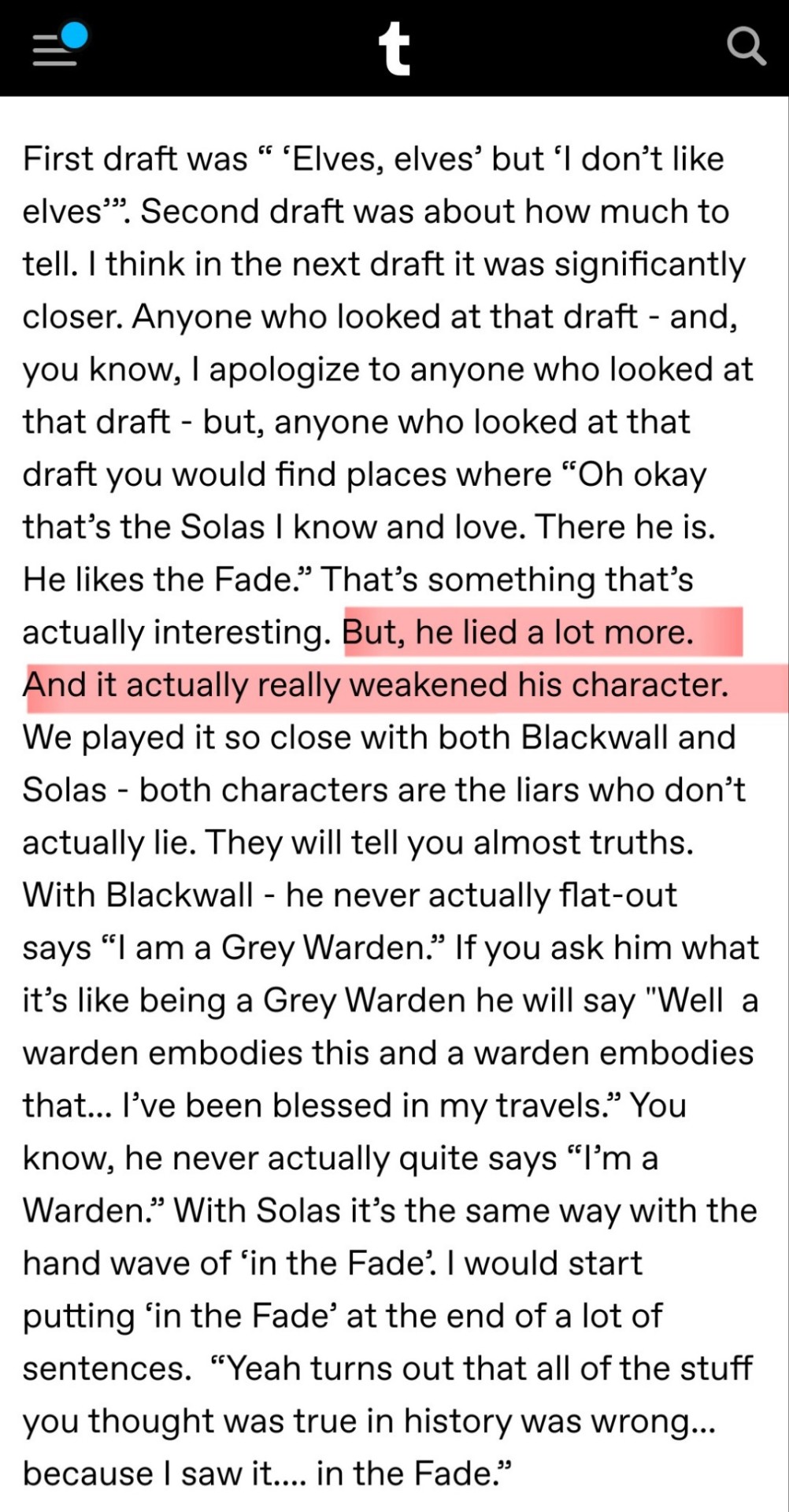
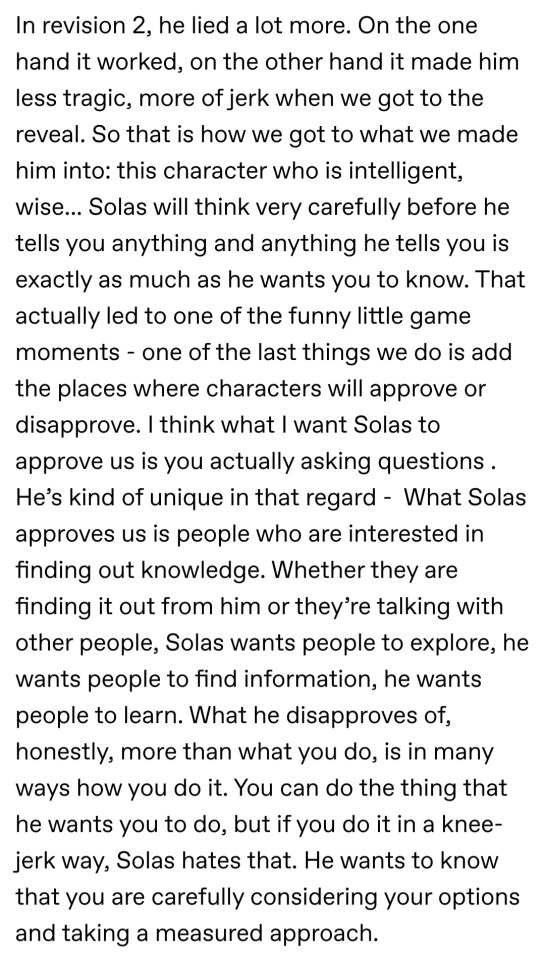
Here's a transcription I found here which is where i took the screenshots above. Since I know not everyone has 40 minutes to listen to an online radio interview.
I however highlighted the main point since most of you are not reading the screenshots anyway but skimming through. Rant under Read-more. Also bc i try to not be too negative on people's dashs but also i wanna ramble some more.
"But he lied a lot more. And it really weakened his character."
You can tell this happened during the game. Solas lies only once within Inquisition. He says something he can't be vague about and you push him so he lies, badly. He usually tells the truth vaguely. Typically Solas lies no more than Blackwall.
I fully believe that if in Inquisition your inquisitor figured out that Solas was Fen’harel and asked him bluntly to his face he'd confess. He might even be impressed. But why would you ever start to think that. No one assumes that their coworker is actually Poseidon regardless of how much they love the beach and ocean.
He hides in your expectations.
You can't ask him about being an ancient elf or being Fen'harel of myth because those aren't very probable. They're astronomically low to be truth within that universe. And outside, no one finished DA2 and went i wonder if one of our next companions is the Dread Wolf. Sera said, impossible things can't be surprises. He doesn't have to lie so when the truth comes out it's becomes obvious on a second playthrough.
They then actively bring back a problem they fixed in Inquisitions development. That they were open about fixing. That having a character that outright lies to you makes you have no intention of even hearing out the character. It retroactively undercuts Inquisition bc i see people trying to find Solas' lies in it when they aren't going to find any beyond the court intrigue.
It undercuts any lore we do get from Solas bc people dismiss it outright as being a lie from Mr "I abhor blood magic". I feel like shaking people's shoulders like no, dont do it.
They retconned him guys i have proof from 2019.
And its like if you hate Solas is this even satisfying? Like that's not Solas. His motivations are gone (that's a whole other post) and so is his core personality trait. It's like they went here's the Dreadwolf but during the ten years they replaced the smug asshole who was insufferably right with a 20 yo senior chihuahua that doesnt have any teeth.
My favorite villains are those that tell the truth. Because nothing hurts more than the truth. Can you imagine if he told you the truth. If he told you horrible things that you dismissed as lies to only be true. Wouldn't Varric’s death have more weight if he told you Varric was dead only for you - for everyone - to see him in the Lighthouse. If it was a spirit who took his shape to help you or even because it saw something worth reflecting in your memories.
So you dismiss him until it's revealed near the end oh he was telling the truth and you have an oh shit maybe he was right about other things but its too late to try and stop any of the truths he told you which could be from allies/companions betraying to stuff about Ghilan'nain and Elgarnan.
Like the only way to redeem Solas was to listen to him and by going out of your way to address problems he sees and you can find the alternative to tearing down the Veil by a series a little puzzle pieces throughout the game.
Have it be he will only listen to you if you listen to him. That he'll reject your other solution bc why the hell would he trust you if you couldnt extend the same.
Like Solas couldve been a great villian and he should've been great for both the haters and those that liked him. Not only the romance but for those who became his friend. Like i keep coming back to if i hated Solas would i be satisfied with Veilguard.
And the answer is no because that isnt Solas.
Tricking him has no weight bc he's an idiot in Veilguard like not even in the ending bc doesn't notice you switch the dagger around like right in front of him but none of his actions make sense. Ppl have mentioned the regret prison makes no sense for Elgarnan and Ghilan'nain bc they don't have regrets.
Attacking Solas has no weight because he literally needs the shit kicked out of him by a dragon for it to even begin to work. They literally need him to be at deaths door before its realistic that Rook could take him in a fight.
Redeem has no weight bc of the massive retcons to his motivations. They had to retcon the post credits scene bc even if Flemythal went hey i don't want you to do this Dai Solas wouldve went okay but that doesnt solve my other problems with the veil including the corruption of spirits and the fact its in literal shambles so i guess is still coming down.
I'm just disappointed. By the end of Trespasser they had a great villian and they just tossed it to the side and reverted him and people are arguing about a character who's sole defining trait in Veilguard is a problem they solved before Inquisition launched.
Basically we can sum it up with a screenshot.
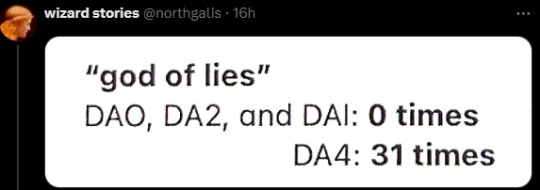
#veilguard critical#solas analysis#datv critical#a bit#its more veilguard disappointment#but that's not as catchy#TIM in me 3 is a better enemy than solas#no i will not elaborate#and its like i love things about Veilguard#choosing gender and pronouns and having it matter within the game should be the standard for character creation games like this#and also how ur character feels about themselves#i don't even use it and i truly believe it's that groundbreaking and great#I remember being so excited pre launch like yeah you can really dig deep into your rook and what else could they use this flesh out your pc#feel free to use any speculation for fics like the varric thing#did alt text for the first time lemme know if i need to change anything
650 notes
·
View notes
Text
Thinking about the fact that Mabel and Dipper didn't know they had two great uncles.
Yeah they are 12 and at 12 I had a shotty understanding of my family tree- But really? Nobody brought up their great uncle? Stanley? Especially since they'll be staying with his twin brother, Stanford?
Shermie never went to Stan's fake funeral, which to me means the twos relationship was strained on some level. If Shermie is older that means his view of Stan was poisoned in some way, that even as kids they weren't close. If the Shermie is younger then he never even got to meet Stan and all he knew about him was how he failed his family. Hell, people probably barely mentioned Stanley TO Shermie.
The fact that Stan had become a black stain upon the Pines family name makes me so vividly upset. Stanley faked his death and the family just- seemingly decided to strike him from the record. To pretend he didn't existed to spare themselves the sadness and shame.
Stanford and Shermie Pines. The only children worth mentioning of Filbrick and Caryn Pines.
It was never Stanford that was lost to the world. It was Stanley, ever since he had to leave New Jersy- it was always him that had to be struck from the record. Change his name, change his state, change his affiliations, destroy the remains of ghost that was Stanley Pines. Kill him so the family doesn't bring him up, doesn't ask questions, stops asking "Stanford" about his twin.
I just keep thinking about the fact that since the day he made one single mistake all the way up until Ford walks out of that machine- Stanley Pines was killed and did not exist. And Stan himself had no one to blame, he had to play the part in his own demise- He is the only one who ever knew Stanley was alive and has been for decades.
He lives in the multitudes of every personality he's ever taken, all in the hope that he himself can stop being Stanley Pines.
#gravity falls#grunkle stan#stanley pines#STANLEYYYYYY#STANLEY THEY COULD NEVER MAKE ME HATE YOU STANLEY!!!!!!!!!!!!!!#sharky rants#Just. Imagine the fucking shame you have to live with#the shame that you can never be yourself. That anything you were is unwanted and forgotten#The shame of just BEING- Of taking space of- of /breathing-/#Imagine the world; your friend; your family; your colleagues being so ashamed of having known you#that you feel more comfortable with a persona to present.#You feel more comfortable stealing the identity of someone you care for deeply if only to help#If only to feel capable for once. To feel like you belong- Like youre doing something good for once#Imagine the shame that brings you to be comfortable not being yourself for 40 years.#ALL CASE YOU BROKE ONE FUCKING PROJECT??????? COME ON#I mean- the deeprooted shame was started from earlier. He was 'the stupid twin“; 'the troublemaker”; “the cheat and thief”#This was a long time coming#But those werent MISTAKES- The one time he genuinely made a Mistake he lost everything#Like he really mattered so little to the people around him#and he cant really blame them.#My cousin is a genius. Hes smart and academically achieved since I was a baby.#The only thing I had that he didnt was my ability to draw. to be creative. The guy for the longest time had a better social life then me too#I used to get brought to tears seeing his accomplishments- seeing people praise him. The shame lived in me any time I had to see him#The shame that I was the black sheep of the family next to the golden standard for a son- for a student- for a friend.#when I was none of those things#And Im lucky he was my cousin- cause if he was my brother that would have haunted me EVERY DAY rather then once or twice a year#Im better with it now; Im more content with who I am- But trauma dump aside-#I very very very much understand Stans shame in being the stupid one. The unachieved one in a family full of achieved people#the shame thats angry at him for being better. at the family for treating him special. and most of all at yourself that you cant be better#its a visceral feeling that I sadly understand
954 notes
·
View notes
Text
if the only time you bring up A Secret Third Thing is when someone has suggested generally celebrating or uplifting platonic/queerplatonic fictional relationships in spaces that ordinarily obsess about romantic ones to the exclusion of all else perhaps consider why you’re doing that and also stop.
#gav gab#im tired lmao#‘i think platonic relationships are worthy of celebration too’#‘BUT WHAT IF THE NATURE OF THE RELATIONSHIP DIDNT MATTER IT WAS JUST THE DEVOTION WHAT ABOUT A SECRET THIRD THING!!!’#cant help notice you never do this when romance is being discussed#:)#cant help notice you only bring this up when people want to be specific about enjoying SPECIFICALLY platonic or queerplatonic dynamics#wonder why that is :)#wonder what you actually mean is you want to change nothing about how you prioritize relationships#and also escape any kind of challenge to that#rather than just owning that you don’t fucking care about platonic or queerplatonic dynamics#which is whatever just please be straight up about it#let’s not do this wink wink theatre please#TO BE CLEAR this is not about any time anyone uses the phrase ever#please don’t come at me for that im not saying The Whole Phrase is inherently bad#just that ive noticed some patterns in when people use it and what brings it up
347 notes
·
View notes
Text
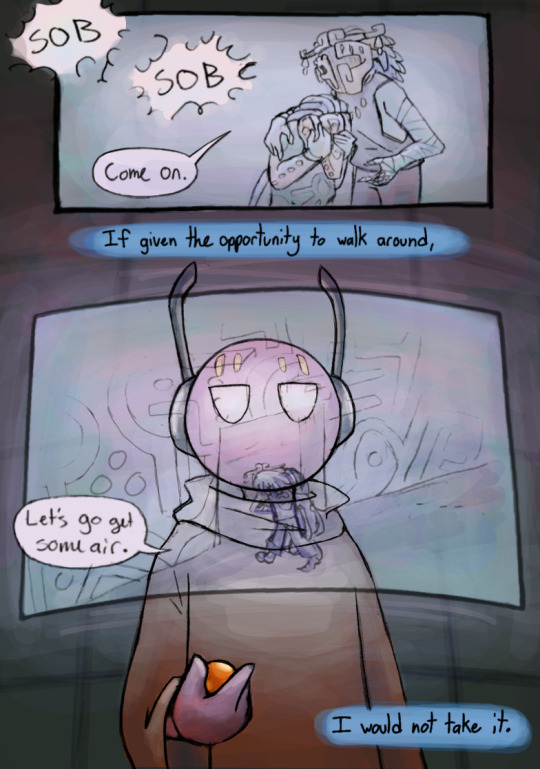
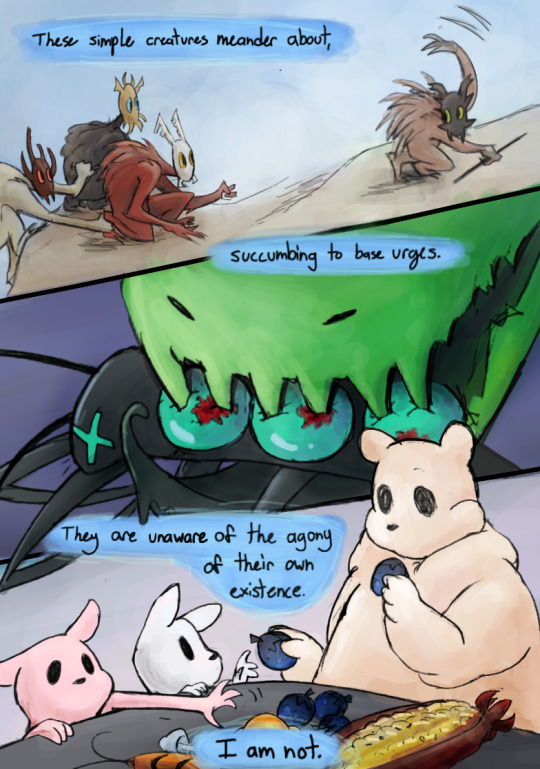

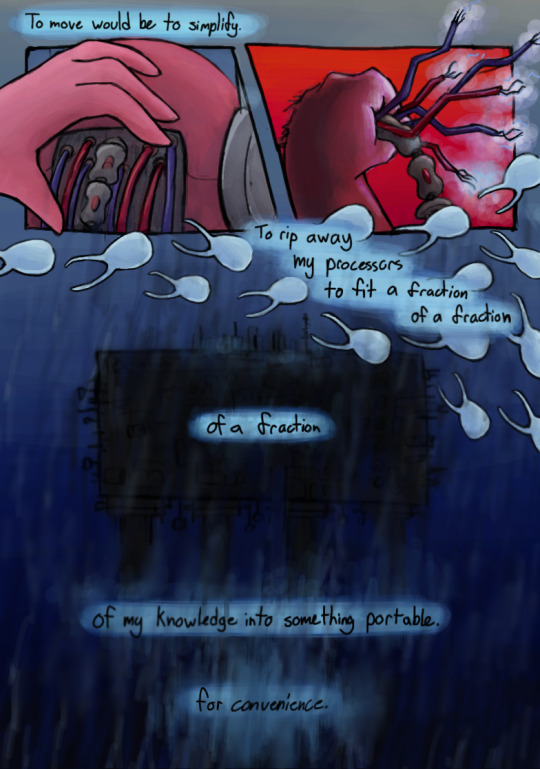
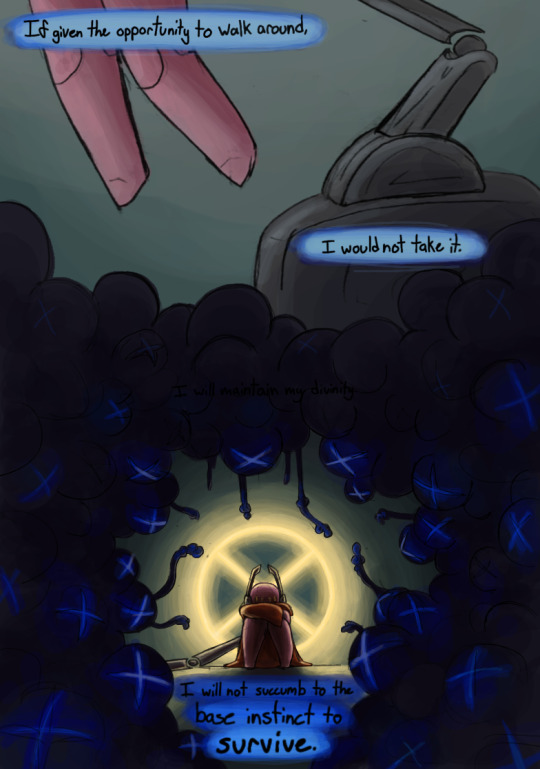
case study of the self-identified god
#obsessed with the fact that rain world is a game about survival#yet every character we meet has the express goal of trying to optimize killing themselves#every creature in game seems perfectly content fulfilling their role in the ecosystem no matter how many cycles they do the same thing#(rly obvious with gourmand's entire route. guy who lives their life to the fullest without the slightest hint of resentment)#it was really only the ancients who thought they were above it and thought of it as something to escape from#5pebbles is so interesting because the only reason hes “”“godlike”“” is because of his vast knowledge. if he was in any slugcats shoes he#would die instantly which is ironically what hes been trying to do this whole time#this comic was kind of exploring the idea of awareness (divinity) as something that drags down ones enjoyment of life (walking).#if 5p would humble himself down enough to walk around like any other creature#he would a) be much happier in life and b) achieve the ascension he's been gunning for for millennia like all the slugcats did#but he never will.#getting rid of all his work on the problem or even his awareness of it entirely#would just be a trick of convenience that steals away his godhood#and him calling himself godlike is kind of a cope LOL#a cope being faced with a problem he was never meant to solve#a cope being faced with what he did to moon#a cope being faced with the rot inside him#oh well.#anyway fuck 5 pebbles i hate that guy#rain world#rain world fanart#rw five pebbles#rain world five pebbles#rw gourmand#rain world gourmand#five pebbles#rain world void worm#rain world ancients#also JUST KIDDING ilu 5p. you suck but i💛u
2K notes
·
View notes
Text
everytime someone says a version of "what if Shifty is intentionally manipulative and maybe even evil–" a part of me dies a little inside
#no matter what you think of her#you can't deny just how UNFAIR things are from her perspective#both she and the vessels have so little agency in their own fate#they have no choice. they can only REACT to *your* choices#and you can always choose to be cruel#to deny her of any compassion and any chance at connection#does she comes off as pushy and entitled?#bitch it's literally her EXISTENCE on the line#not vibing and being overwhelmed with her is perfectly fine and valid honestly#but do not come at me with how she's secretly evil and the villain of the story all slong#slay the princess#< main tagging this. fuck it#sal being salty#< new tag unlocked. that's how mad this shit makes me lol
213 notes
·
View notes
Text
Listen, I'm not here to dictate how you should interpret Dottore's character, I'm really not; but the one misconception about him that really kills me is the idea that he's a "sadist who experiments on people for fun". Where in the world did people even get that from?
Here's the truth: Dottore experiments on people because he thinks he should. Because, if experimenting on someone will get him the results he desires in his endless pursuit of knowledge, then he will not think twice before going through with the experiment regardless of how cruel it is. Tighnari, while recounting his conversation with Dottore, says, "he never came off as malicious, but an utter lack of compassion permeated throughout our conversation". That's who Dottore is - someone lacking compassion for people, someone who sees himself as greater than the others (whilst also seeking recognition in his homeland, but that's a separate can of worms that I'm not opening today). Dottore won't think twice about how his subjects feel because he does not care; there is no pity nor excitement, only a need for results, answers. So... the next time someone says he's a sadist, just keep this in mind: he's literally not.
#it's a needless rant but this has been on my mind for ages#it's one thing when haters misinterpret him but his own fans? guys. guys guys guys#we can't be into the man who's all about knowledge whilst being clueless ourselves#do it for him! see what he's really all about#but aside from that: everyone is free to enjoy a character in any way they desire. don't let my words stop you from making fun hcs about hi#or anything else for that matter#with that said: i'm off#dottore#il dottore#genshin impact
334 notes
·
View notes
Text
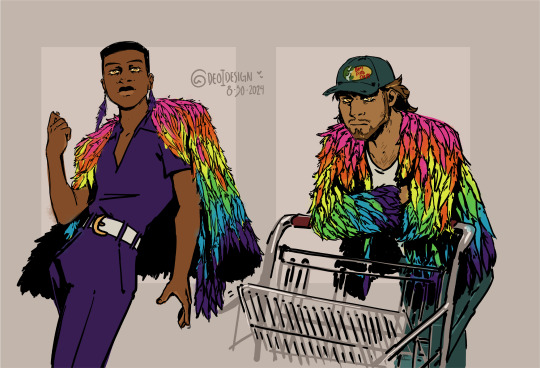
Wearing your boyfriend's jacket
#for the anon asking who would wear it#any one of my characters WOULD wear it#its just a matter of how...#you dont understand my passion for fashion and what this means ok#it means an article of clothing is not about the clothing at all#its about how it fits and what it goes with and how you choose to wear it#a shirt is not just a shirt its a part of a whole...#I'm so passionate about this... it doesnt really show in my comics but thats mostly cause. there is only so much time I can devote to thing#anyways#adam is able to make anything look good#and steve is able to make anything seem like hes owned it for 10 years#they can both wear anything but in extremely different ways...#anyways this was a nice little break#its been hard HAHAHAHHA not gonna lie having an extremely rough time#I so so so do not want to return working for webtoon#I need you to know I am ONLY doing this for my readers#because I could use more time. I could use forever away from webtoon#but. I want to see the comic through! and so I will.#I'm so tired of them...#and also still frustrated by people being like 'is this ever coming back' and all that#but its fine. its coming back I'm working on it...#and its good.. its gonna be so good......#time and time again#ttawebcomic#adam and steve#sketch#I JUST REALIZED I SAID ANON...#I MEANT ASK#my brain just calls all asks anon
273 notes
·
View notes
Text
in other news, i still hate the 'curse' demise says being seen as a literal thing so widely, like he is somehow powerful enough to bend the world to that cycle and even the gods being helpless against it (unless they want it or even orchestrated it but that option never comes up does it), its never even considered to perhaps not be real, like its a literal law of the zelda world, imo its pretty boring itself and also boring as an explanation for the cycle and most often really only gets used to or talked about to make ganondorf be just a helpless evil guy that is born evilly bc he is cursed and if you took away tha demon juice he would side with hyrule and be good tm (a side effect being that people think he is the actual reincarnation of demise like zelda is supposedly of hylia which also sucks IMO) .... or to make demise some sort of puppet master, which i hate even more no .. no i hate that the most (bc it makes ganondorf a puppet and demise the evil demon master and thus ruins both my favs yippie)
#ganondoodles talks#zelda#also if i am allowed to be salty at that#while recognizing that it is most important for ganondorf and also that it is pretty rare to begin with#but that even when villains are discussed demise really is neevr considered as anything than the source of evil tm or curse doer#and the only thing that ever matters about him is the curse tm .. HE doesnt matter only that one thing he says does :/#like other times seeing these villains its (rightfully) discussed how lame it is and sometimes outright harmful#but then its just accepted when it comes to demise#like ........................ maybe its my blorbo brainworms but#why does he never get the benefit of the doubt ........#....................wrote a longer post before but saved it as a draft bc i started to ramble about my comic again#been doing that alot ....#writing a long post and then instead of posting jsut saving it as a draft bc i dont wanna annoy people any more with my rants#both about totk and about my own stuff i keep being so slow on working with
82 notes
·
View notes
Text
the thing about trans girl cissie is that "cissie" is, like, up there as a prime contender for the funniest possible name for a trans person to go by. a+ absolute power move we LOVE to see it
#rimi talks#the thing about cissie is that no matter in what direction she is Not cis. and therefore she's inherently hilarious.#names are a game and she is winning!!!#i do have a real soft spot for transfem cissie the more i think about it though like... 🥺#something something gender as a performance. gender as a mask. gender as living up to her mom's dreams.#something something quitting heroics and being both relieved and dismayed that she doesn't feel any less like a girl for it#cissie
270 notes
·
View notes
Text
anyway, i hope taylor had the happiest, most amazing birthday, feeling celebrated and extra cherished by her loved ones and spending it in whatever way made her happy. that’s what she deserves after all that she’s given of herself this past year, and nothing else should matter to anyone.
#taylor swift#i’ve seen some absolutely wild takes#particularly about things not being posted on social media#but does any of that actually matter if she herself was happy and felt loved? no#*
81 notes
·
View notes
Text
It's a time-honoured tradition- every time Sam comes across Izzy (and Ed) in their travels, he asks Izzy to marry him. And every time, Izzy turns him down.
At this point, Sam is asking more for the sake of it than any belief Izzy will ever say yes, a remnant of childhood dedication touched with 30 years of heartbreak and regret- though even now, a small part of him still holds out hope. Sam's promises have only got more extravagant over the years, from a job as his first mate, to a captaincy, a fleet at his command, a whole fucking island if that's what Izzy wants- but he knows it isn't though, not really. If Izzy was ever going to agree to marry him, to leave his life and go with Sam, it wouldn't be for anything Sam could offer him. Izzy never did care for flashy shows of wealth, for a ship or to be captain. The only thing that ever mattered to him was loyalty given, and loyalty shown in return.
It all comes to a head after Stede left and came back, after Izzy lost a toe, lost his leg. Sam hasn't seen him since before things with Ed started to really slide off the rails, before stress permanently set into the lines of Izzy’s face. So, when he sees a dishevelled man with a hoof for a leg in a no-name port, he doesn't even consider the idea that he might know him. It's only when he turns towards him, and Sam catches a glance at those oh too familiar tattoos, he realises this is Izzy, his Izzy, that stands before him.
Knowing Izzy's discomfort with pity, he doesn't treat him any differently than he would in years gone by, positioning himself in Izzy's line of sight before approaching and sweeping him up into a bone crushing hug.
“Israel-goddamn-Hands!” he exclaims, as Izzy grumbles back a begrudging “Samuel-fucking-Bellamy”, a tradition almost as old as their friendship itself. Izzy might not hug him back, but he can’t keep the corner of his mouth from twitching, just for a second.
(If Sam holds Izzy a little tighter and a little longer than usual, well. That's his business)
By the time Sam lets go, most of the crew has appeared in the town square, drawn in by the commotion. They may have given Izzy his leg and welcomed him as one of them, but still there’s an underlying tension, with nobody quite ready to set aside everything that happened before the Kraken. Seeing him cosying up to an unknown man sets everyone on edge, unsure whether to come to their first mate’s aid, or to assume that they've been betrayed once again.
When Ed sees that the yelling was Sam, his hand goes tense where it's held in Stede's. He knows the routine, has seen it more times than he can count, but as he watches them part he realises that this is the first time in a long time he's unsure of what Izzy's response will be.
Knowing that something’s different, knowing that Izzy's feeling vulnerable already, Sam doesn't go for the same flashy proposal he’s been giving for years. He doesn't promise Izzy the world, he doesn't cause a scene (or, any more of a scene than he already has, anyway). He looks at the fractured man in front of him, takes his face in his hands, and says the exact same thing to him he said when they were little more than boys. “Israel, I have to ask you. I know what you'll say, but I have to try. Come with me. Marry me and sail away with me. I'll keep you safe”
And Izzy… hesitates. He glances over at Ed, at Stede, and says to Sam “...We’re staying in port for a week. Ask me again then”
That's the moment Sam knows there is something deeply, horribly, wrong. He's not just looking at an Izzy who got seriously injured in a fight and is struggling to cope, this is something so much bigger than that- and that Ed has something to do with it. Izzy wouldn't even be considering leaving if he didn't. Whether it was negligence or something more sinister, Sam doesn't yet know, but he intends to find out.
#i feel like the little paragraph about the crew is real clunky and out of place but i wanted some kind of establishment of where those#dynamics are at. its important that the crew is something for izzy to consider in his decision; but also that their relationship isnt so#solid he would stay for them alone; yknow?#im sorta aiming for a s2e5 era but like. early in those themes. he cant be all sorted yet i need him to be struggling#anyway this is part of a much larger scenario in my head that im never ever doing anything with but i wrote THIS bit in a daze in like. jun#and i got thinking about it again and i think?? it holds its own as a 'hey think about THIS' snippet. idk you decide#youre welcome to interpret this as solo bellhands but in my head it Has morphed into sam/izzy/ed/stede#because i cant not put edizzy in things any more. izzy has two hands#i also think the comedy potential of one of your boyfriends HATING your other boyfriend is gold. 10/10 dynamic#stede is mostly along for the ride in this but also i think they need him#aaaaand. the sam/ed bracket i think can only be closed in exceptional circumstances. i think they 'hate' each other too much#...which is WHY someones getting kidnapped!!! yay#anyway its all irrelevant because ill never write it out. i can do silly chill things but thatll require work#nyxtalks#ofmd#our flag means death#izzy hands#israel hands#sam bellamy#bellhands#i wanna also say. the general concept of repeated sam proposals has been floating around my head forever#it used to be a more silly thing like i referenced at the start but. s2 gave me angsty feelings i guess#i cant not have izzy have feelings for ed right now which inherently adds layers to Any bellhands scenarios i think.#but yeah. its a Classic Bellhands vibe for me. sam seeing izzy at sea or on shore and asking him to marry him (again)#i like to do this with jackie too. i think i just want that man to be obnoxiously desired#(theres also layers of my personal hornigold era lore built into this but i hope it holds up without u knowing it. tldr. sam lost izzy by#being an idiot n fumbling the bag. thats what matters. izzy went with ed and sams been trying to fix it ever since)#i probably should have readmore'd this but i didnt think it was Quite long enough. or had a good break point. sorry <3
141 notes
·
View notes
Text
Me: I wonder what Hook calls Sampo in the Japanese dub? Probably oji-san, since it's shushu in the original Chinese?
Hook: Sampo-ojichan!!

Oji is "uncle," which is hilarious because Hook calls Natasha by "older sister" when she wants something. So Hook either just really wants to get on Natasha's good side, or she takes Sampo at face value when he refers to himself as an old man. She trusts him a lot and takes him at his word and she calls him as such!
And Sampo calls Hook either ojou-san or oujo-san (I can't find the Japanese sub to see the spelling, and I can't tell them apart by ear)!
One spelling, oujo, means "princess," it's how you would refer to royalty. The other, ojou, (which I assume is what he's actually saying) is something you call the young lady of a high-class family with a high social standing. In Genshin Impact, the intro scene for a popular ship, chilumi, shows Childe calling Lumine ojou-chan, which the English dub translated as "girlie." Since Sampo uses -san instead of -chan, his is more formal and respectful, it's more like "young lady."
...It's also how you would refer to the daughter of a yakuza leader, which I love, since Hook leads her own little gang (the Moles) skzhkskdkd
But it really gets me in the heart, because! Hook is generally looked at as a delinquent by most adults. Which I mean. Not without good reason, she
calls Natasha an old witch
frequently sneaks out into the Fragmentum
has left graffiti all over the side of the orphanage
was constantly picking fights with other kids
beat a man unconscious for stealing from her dad
and has already picked up on how business gets done in the Underworld, and uses/actively participates in it to get what she wants- she basically acts an information broker
like Hook earns her reputation haha. The Underground is lucky that what Hook wants is just like. Candy and toys and to play hide-and-seek. I'm sure she'll have the capability to raise all kinds of hell and be more like an actual gang leader when she's older, even if she chooses not to act on it.
So Sampo calling her so politely and respectfully is really sweet and cute! Yes, he's polite and respectful with everyone, but that's just it- he treats Hook much like he does everyone else. He doesn't tell her to buzz off because she's a kid. He doesn't lie or try to cheat her or assume she's naive because of her age. He never talks down to her. He really does just treat her like a respected business partner and he takes her seriously, which Hook really seems to appreciate. And even when Sampo does treat her like a kid, it's not in a negative way; he guides her on little adventures and chats with her and takes her for joy rides on his moped. All of which Hook also really appreciates, since everyone else is too busy trying to get by to make time to play with her. She absolutely adores him.
I hope they officially join forces someday and terrorize all of Belobog with their shenanigans JSKJZNDKSJ
So Hook calls Sampo "Uncle Sampo" in a particularly affectionate/endeared tone, and Sampo calls Hook "Young Miss Hook" in a very respectful tone! And to reiterate:

#honkai star rail#hsr sampo#hsr hook#WHAT BUSINESS DO THEY HAVE BEING SO ADORABLE AUGH OTL#they're so cute...my heart...#I've seen people say Sampo is a bad influence on Hook but I don't really like that because I feel it takes away from Hook's character.#Let her be awful all on her own!!#god forbid women do anything skhzksjsnz#I actually do really like her just being like this no matter what though because I think Hook is a fascinating example of just how harsh-#-the Underground is and how it's developed separately from the Overworld and how it operates and what it takes to survive down there.#like Hook is like this because she grew up down there during the worst times.#even if she was born before the halves were sealed off she's too young to remember any of that.#I'm pretty sure the end of the main quest in Belobog was the first time she'd ever seen the sun.#and so I think it's really neat seeing how she operates and what she thinks of things. she offers an insight not many other characters do.#she's too nice for it but I would love for her to be more like a gang leader as she gets older it would be a fun divergence jzkzjdndkd#Sampo can be one of her business partners. Belobog is shaking in fear skxhjsjddn#hsr#honkai star rail sampo#honkai star rail hook#pitch dark hook the great#sampo koski#hook & sampo
171 notes
·
View notes